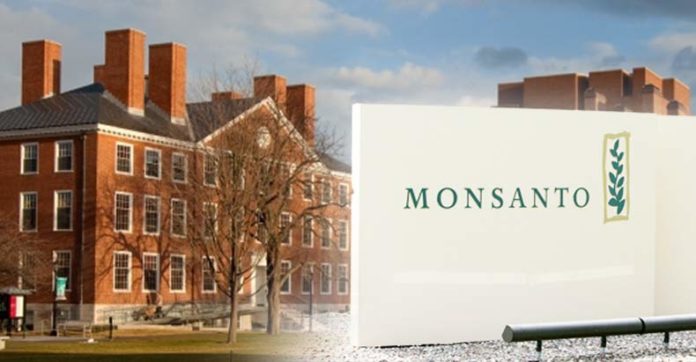
It has been confirmed that Monsanto directed a Harvard professor to write an influential pro-GMO paper, according to email messages obtained by the Boston Globe.
In the emails, Monsanto instructs Harvard professor Calestous Juma on how to present a paper on a topic that has been suggested by the company.
With the help of a marketing firm provided by the biotech giant Monsanto, the 2014 policy paper titled Global Risks of Rejecting Agricultural Biotechnology, was widely distributed. According to the email, the marketing firm “would ‘merchandize’ the papers online, disseminate them to the media, and schedule op-eds, blog posts, speaking engagements, events, and webinars.”
In 2013, eight other professors received the email from Eric Sachs, Monasnto’s head of regulatory policy and scientific affairs, asking them to write a series of papers. In addition, Sachs also provided the professors with a detailed strategy for public persuasion.
“This will be an important project and is designed to lead to increased engagement on critical topics that are barriers to broader use and acceptance of [genetically modified] crops globally,” Sachs wrote.
Sachs went on to describe a series of seven papers that he asks the professors to author. The e-mail says that the specific topics were selected because of their “influence on public policy, [genetically modified] crop regulation, and consumer acceptance”.
“I understand and appreciate that you need me to be completely transparent and I am keenly aware that your independence and reputations must be protected,” Sachs wrote.
The goal, Sachs said, was to change public dialogue about GMOs “toward a broader understanding of the “societal benefits of [genetically modified] crops” and change policies that are “unnecessarily limiting innovation in the biotechnology arena.”
Although Juma did not get paid by Monsanto and used materials from his own book, it appears the direct influence of a multinational corporation is in violation of Harvard’s rules. “faculty members should not permit outside activities and financial interests to compromise their primary commitment to the mission of the university.”
“It’s not that I was trying to hide anything,” Juma said in an interview. “It may have been bad judgment on my part, but that’s how I was thinking at the time.’’
Juma’s paper claims that GMOs can be used to increase food security in developing countries. According to the paper, “biotechnology has enabled the genetic advancement of crops, improved soil productivity, and enhanced weed and pest control,” and has the potential to “lead to increased food security, as well as improving health in developing countries by enhancing food nutrition.”
However, in a report that evaluated 20 years of GM research and 13 years of commercialization, these claims were debunked. The report, titled “Failure to Yield,” found that despite popular belief, GM crops are not producing significantly higher yields, and non-GM breeding and farming methods have proven to be better at increasing yield.
In actual fact, the only thing GM crops are responsible for increasing is the use of chemicals. Overall pesticide use increased by 26 percent in ten years, and glyphosate use—which the World Health Organization has listed as a probable carcinogen— increased 10-fold from 1996 to 2012.
The creation and distribution of this propaganda paper has reaffirmed the depths of Monsanto’s influence. The public are being betrayed by federal branches, regulatory agencies and academia all on behalf of the biotech companies that are destroying our health, communities and our planet’s soil.
You want to support Anonymous Independent & Investigative News? Please, follow us on Twitter: Follow @AnonymousNewsHQ
This Article (Emails Reveal Monsanto Instructed A Harvard Professor To Write Pro-GMO Paper) is free and open source. You have permission to republish this article under a Creative Commons license with attribution to the author and AnonHQ.com.





They’ve bought more fake university studies than Big Pharma has pills.